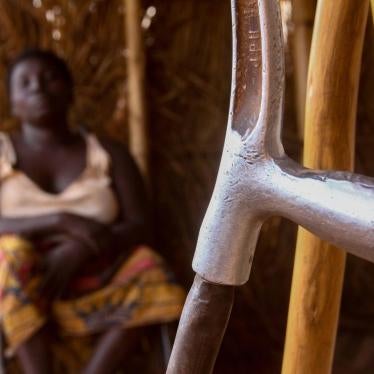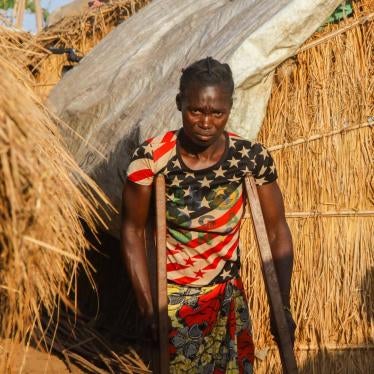(Brussels, December 7, 2017) – The European Union is taking important steps to ensure that EU-funded humanitarian assistance reaches people with disabilities, the European Disability Forum, Human Rights Watch, and the Norwegian Refugee Council said today. People with disabilities in humanitarian crises face massive problems in getting even basic services such as food, water, sanitation, shelter, education, and safety protection.
At the 4th European Parliament of Persons with Disabilities on December 6, 2017, Christos Stylianides, the European commissioner for humanitarian aid and crisis management, announced a number of measures that would considerably improve access to humanitarian aid worldwide for people with disabilities.
People with disabilities are among the most at-risk groups in humanitarian situations. Yet, they are also among the most overlooked, in part due to insufficient knowledge about including people with disabilities and a lack of clear standards on how to carry out inclusive humanitarian action.
“Aid actors sometimes consult organizations of persons with disabilities, but may not consider that we can also help directly in humanitarian operations,” said Yannis Vardakastanis, president of the European Disability Forum. “After all, we know what it means to live with a disability and what we need. This must change. Nothing about us without us.”
Fifteen percent of the world’s population – or one in seven people – has a disability. This figure is likely to be even higher in emergency situations because of conflict or disaster-related injuries and lack of health care and other services.
In South Sudan, Greece, and the Central African Republic, Human Rights Watch has documented that people with disabilities face neglect, abandonment, and barriers to basic services in refugee and displacement camps. One man with a physical disability in a camp for internally displaced persons in Central African Republic said he needed to crawl into the latrines: “I have to walk with my hands and I don’t have gloves. I must wrap my hands in tissue if I can find it. Most of the time I can’t find it. Honestly it makes me pity myself.”
Research conducted by the European Disability Forum among refugees in Greece also found a lack of access to services, including medical care, and insufficient access to assistive technology. EDF’s national member, the National Council of Persons with Disabilities, is now directly involved in providing support to refugees with disabilities and their families, in cooperation with UNHCR, the UN Refugee Agency.
Stylianides announced that starting in 2018, requests for proposals from the European Commission’s humanitarian agency (ECHO), which funds the operations of humanitarian organizations on the ground, will highlight that applicants must include people with disabilities in their actions. In addition, ECHO will develop standards for addressing the needs of people with disabilities in all EU-funded projects.
Stylianides also promised to consult people with disabilities and their representative organizations in designing and carrying out these initiatives, in line with the principle of “Nothing about us without us.”
“This is a real turning point in global efforts to ‘leave no one behind,’” said Shantha Rau Barriga, disability rights director at Human Rights Watch. “If the EU makes these changes, it could improve the lives of millions of people with disabilities who need aid in emergency situations around the world.”
The EU has a clear responsibility to include people with disabilities in the humanitarian operations it funds, the groups said. The United Nations Convention on the Rights of Persons with Disabilities, ratified by the European Union, requires the EU to ensure the protection and safety of people with disabilities in situations of risk and humanitarian emergencies without discrimination. In addition, the EU has endorsed the Charter on Inclusion of Persons with Disabilities in Humanitarian Action, making a commitment to eliminate discrimination against people with disabilities in aid programming and policy, and to ensure that people with disabilities have access to aid and services.
To bring the voices of refugees with disabilities to policymakers in the EU, the European Disability Forum, Human Rights Watch, and the Disability Intergroup of the European Parliament organized a roundtable panel in the European Parliament in March. At the event, Nujeen Mustafa, a young refugee with a disability from Syria, addressed Commissioner Stylianides: “It’s kind of a sad fact that in the 21st century, toilets and basic services are considered a luxury for some people. All of us, and especially people with disabilities, deserve much better.”
While governments, donors, and aid agencies are overwhelmed with many competing priorities during emergencies, the needs and concerns of people with disabilities can and should be addressed right from the planning stage, the European Disability Forum, Human Rights Watch, and the Norwegian Refugee Council said. This should include making sure that aid workers, peacekeepers, and local and national authorities are sensitive to the rights and needs for protection of people with disabilities and strengthening the workers’ capacity and skills to identify and include people with disabilities in systems both for preparedness and response to emergency situations.
“As one of the world’s largest humanitarian donors, the European Union has tremendous potential to press its implementing partners to include people with disabilities in their activities and become a leader on the inclusion of people with disabilities in the humanitarian space,” said Edouard Rodier, Europe director of the Norwegian Refugee Council. “We call on all donor agencies to follow ECHO’s example and make sure that the needs of people with disabilities in crisis situations are no longer overlooked.”








